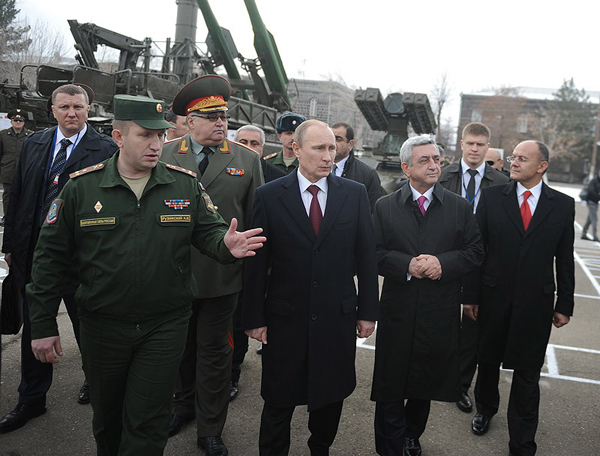The world deals with a new Russia
In recent days, the international community has begun to be more open to the topics on Nagorno-Karabakh conflict danger, possible outbreak of hostilities by making comparisons with events in Ukraine, and in this context, raising the problem of the role and influence of Russia.
The Lisbon, Madrid principles, the UN resolutions and relevant documents adopted by other international organizations exist with the purpose of resolving the Nagorno-Karabakh conflict, and OSCE is working with these principles, said the OSCE Parliamentary Assembly President Ranko Krivokapic, yesterday, in the interview with the journalist in Baku. He assured that they are seeking to intensify the activity of the Minsk Group and to find conflict solutions together with the OSCE Chairman-in Office. “The recent events in Ukraine have shown that we need to work hard and achieve certain results in the near future on Nagorno-Karabakh conflict settlement,” said the President of OSCE Parliamentary Assembly.
And, Personal Representative of the OSCE Chairman-in-Office Andrzej Kasprzyk noted that the situation is tense on the contact line of Azerbaijani and Armenian troops. Answering to the question referring to recent developments in Ukraine, Kasprzyk assured that it is important that the Nagorno Karabakh conflict resolution does not fade into the background due to events elsewhere, and that the OSCE Minsk Group Co-chairs are working continuously to present new ideas to the sides to move the settlement process forward. All this work is done with the aim of moving the process forward and deescalating tensions, noted the Special Envoy. The U.S. Ambassador to Azerbaijan, Richard Morningstar, drew parallels between the Ukrainian developments and Nagorno-Karabakh, noting that the events in Ukraine escalate the importance of the Nagorno-Karabakh conflict settlement. He explained that settlement of Nagorno-Karabakh conflict has always been of great importance, but today this issue has gained particular importance. “We are witnesses of steps taken by Russia and we want the conflict which plays a destabilizing role in the region to be settled in a short time and that none of the neighbors misuses the evolving situation under various pretexts. The complex nature of conflict resolution requires political will of the parties. The presidents of both countries should jointly take concrete steps to achieve a final solution to the conflict. Of course, resolution of this matter requires cooperation with Russia. We promise that we will do our utmost within the Minsk Group and we will be active. We put forward a variety of ideas to promote the negotiation process and to get it out of an impasse,” said Morningstar.
Read also
A few days ago, Turkish Foreign Minister Ahmet Davutoğlu had considered the Nagorno-Karabakh problem in the background of developments in Ukraine, and has made a remarkable observation that the situation in Crimea may create a “domino effect” in the region. Davutoğlu had added that Turkey’s Foreign Ministry believes that the Crimean events could have a negative impact on the situation in Abkhazia and Nagorno-Karabakh. He also noted that Turkey does not recognize the results of the referendum in the Crimea. Yesterday, in the negotiations with the Ukrainian presidential candidate Petro Poroshenko, Turkish President Abdullah Gül emphasized that Turkey will never recognize the Crimea as a Russian territory, for him it will always be a Ukrainian territory. Gül has also stressed that Turkey will never recognize the results of the referendum in the Crimea.
The international community can be understood… The West, surely, will long enough remember the Ukrainian “lesson”. The behavior of Russia in Ukrainian developments: open policy displayed as of today in the former Soviet Union republics, actually revealed a new reality: the world is dealing with a new Russia, this new a new kind of Russia with all of its ensuing unpredictable consequences.
This is probably the reason why the West is feeling the risk of outbreak of a new tension center in South Caucasus, and in this regard, it gives importance to the speedy settlement of the Nagorno-Karabakh conflict, although all realize that the positions of the parties are very far from the prospect of reaching an agreement.
At this stage, the new Sargsyan-Aliyev meeting organized by the OSCE Minsk Group can be considered a breakthrough to ensure the continuity of the negotiations, as well as putting forward the issue of de-escalating the tension in the contact line. A few days ago, these questions were touched upon by the OSCE Minsk Group Co-Chair James Warlike, who expressed his concern about the tension in the Armenia-Azerbaijan contact line. In the interview with Trend news agency, highlighting that the parties in conflict should focus on reducing violence and rhetoric in order to improve the atmosphere for negotiations, the U.S. Co-chair had noted that the Nagorno-Karabakh conflict is a dangerous conflict. Referring to the topic of Sargsyan-Aliyev meeting, he said that the presidents agree on the need for further high-level talks. “We are working to help them reach agreement on a time and place, but it’s up to them. Their summit in Vienna last November was an important step for the peace process, and we look forward to following up soon on the substantive issues raised at that time. ”
EMMA GABRIELYAN




















































